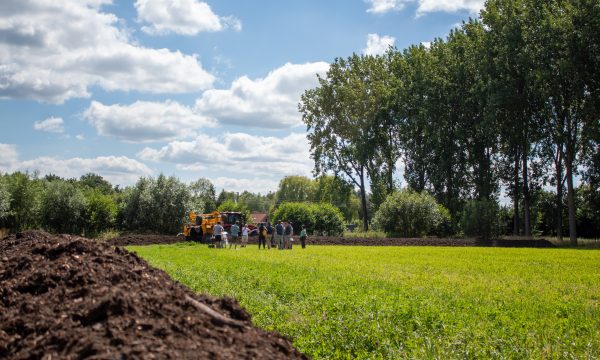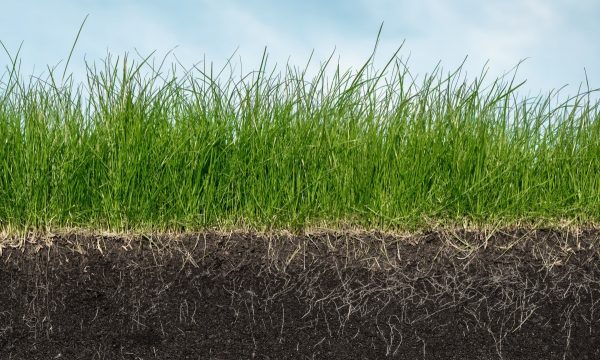Press release Compaction of agricultural soils can be (partly) solved, but prevention is more important
Soil compaction affects about one-third of the arable land in Belgium. Throughout Europe, the phenomenon is considered a serious threat to agricultural production. Agricultural machinery has become heavier in recent decades and continues to drive on already weakened soils. Yet there is still little awareness about soil compaction among farmers, and techniques for prevention and cure are still too little known or researched, according to the doctoral research of Adriaan Vanderhasselt (ILVO and UGent). After many field measurements and experiments, he shows which measures work best to reverse the soil compaction process. "But prevention really remains the better option. And there are smart recipes for that too."
Sources?
The efficiency gains in agricultural machinery have increased a lot over time, but with that they also became a lot heavier and consequently cause a lot of pressure on soils. For example, over a period of 60 years (1960-2020), the average wheel load of a tractor and a combine harvester increased by 3 and 10.5 tons, respectively.
And second factor in the soil compaction story is that the Belgian area of late crops such as corn and potatoes has increased by more than half over the last 60 years. At the harvest stage, there is thereby a greater chance (than in the summer harvest period) of poor weather conditions. The carrying capacity of wet-drained soils is less. In outdoor vegetable production, it goes even further: there, farmers are contractually obligated to go into the field at set times, regardless of any wet weather and/or soil conditions.
(In)visible symptoms
The effects of soil compaction are often only noticeable in the soil itself, and thus out of sight. 'Out of sight' in this case specifically means: out of reach of the plowshares. "At a depth of 30-50cm, a hardened layer forms, a plow sole, where the tilled soil passes into the subsoil. That hard layer only allows water, nutrients, and roots to pass through with difficulty," says Adriaan Vanderhasselt
The negative consequences show themselves in wet periods, when water cannot infiltrate properly, causing erosion or standing water. But equally well in dry periods, because then the roots of the plant cannot reach deeper water and nutrients.
Farmers and researchers agree that compacted soils have a pernicious effect on quality, first of all of the soil itself, but as a consequence also of the crops that have to grow on it. Compacted soils create long periods of standing water, more severe drought stress, more significant crop rot, and often increased nitrogen leaching....
Measurements
The researcher carried out his measurements in all field experiments with a penetrologger, a device that can measure penetration resistance. In soil samples, he also analyzed the so-called bulk density. "But also the farmer himself can easily measure, just with a prod or iron rod. If you can't easily poke through soil layers on muscle power yourself with a thin rod, then a root in that spot will probably also have trouble growing through it. If you do this at several points in your plot, you can get a good idea of where and at what depth the compaction is."
Best is mechanical deep plowing in combination with deep-rooting crop
"We tested different measures in field trials in Landen, Huldenberg, Gavere and Melle, both as a function of prevention and remediation. The fields were mainly cultivated with sugar beets, potatoes and maize, so crops that classically go hand in hand with risk of soil compaction." The measures tested ranged from lowering tire pressure, reducing passages, lower wheel loads, avoiding tillage under wet soil conditions, to deep plowing and sowing deep-rooting crops. These are the results, which you can also read as advice:
Timing:
Waiting the right time to do operations is essential. After all, wet soils are a lot more susceptible to soil compaction. To avoid harvesting operations late in the year in wet soil conditions, use crop varieties that can be harvested earlier. You can also gain 5 to 10% in the spring by waiting a few days before fertilizing and preparing the field until the soil is sufficiently dry.
- Correct tire pressure:
Setting a lower tire pressure when the farmer goes into the field will ensure that the same machine will apply a lot less pressure to the soil surface. During the field trials, there was a clear, beneficial impact on soil quality and ultimately on crop yield. An additional benefit is that fuel consumption is also reduced by driving in the field with lower pressure. The installation of a pressure change system thereby allows tire pressure to be matched to field (low pressure) or road traffic (high pressure). New tire technologies such as IF and VF allow tire pressure to be further reduced by 20-30%. However, when this new technology is combined with higher wheel loads, the positive effect is negated. After all, it is the wheel load that determines how deep the pressure will penetrate the soil. - Deep rooting crops like lucerne, leaf radish and sorghum break through compacted layer:
Even if preventive measures come too late and soil compaction is already present in the field, there is still hope. Deep-rooting crops such as alfalfa or leaf radish appear to be able to break through the plow sole. Even a relatively "new" crop such as sorghum, showed great potential in greenhouse conditions, while the effect of red clover and yellow mustard proved negligible. - Deep rooting crops after mechanical applications:
"This provides the best remediation," confirms Adriaan Verhasselt. First, the compacted layer must be broken through with a deep cultivator and then deep-rooting crops are sown. "The results showed that leaf radish and alfalfa sowing right after deep plowing can stabilize the loosened subsoil and thus also protect against re-compaction," Vanderhasselt says.
But, "It is striking that where we only loosened the soil at depth and then continued the normal activities as before, within the year the soil was already as compacted as on plots where we had not used the deep cultivator. So it's really important to also take preventive measures after mechanical attempts at remediation." Vanderhasselt also recommends the deep cultivator only as a last resort for plots where there are clear signs of soil compaction, and then only if the growth of subsequent crops can be promoted by deeper root development. Deep cultivation is best done under dry conditions.
Spreading the word
The VLAIO research project "Prevention and remediation of soil compaction" in which the doctoral research was embedded, started from the observation that soil compaction is still little on the radar of farmers, contractors and processors.
The research partners ILVO, Soil Science Service of Belgium, Inagro and Ghent University are therefore going to intensively communicate the results of the research on soil compaction. "There were already several demo days where we showed the field trials to numerous interested farmers. Reactions were also collected there about how feasible and affordable the various measures are considered to be. Contacts were also made with tire manufacturers and machine producers, among others."
And now?
Research and practice come close together here. Further research into the physical processes behind soil compaction and the possible measures to prevent and remedy it remain necessary," stressed Professor Wim Cornelis (UGent), soil physics specialist and Vanderhasselt's supervisor. "Step by step, we hope to better understand the processes this way."
ILVO has already taken this research topic on board in several European projects, which, among other things, are looking at whether soil compaction can be detected at the field level using drone imagery and further exploring the role of the subsoil on water management.
Promotors
Dr. ir.Tommy D’Hose (ILVO): Tommy.Dhose@ilvo.vlaanderen.be
Prof. Wim Cornelis: Wim.Cornelis@UGent.be
Video
Video from the demonstration about soil compaction in 2021: https://youtu.be/aeTjWMRv5BI



